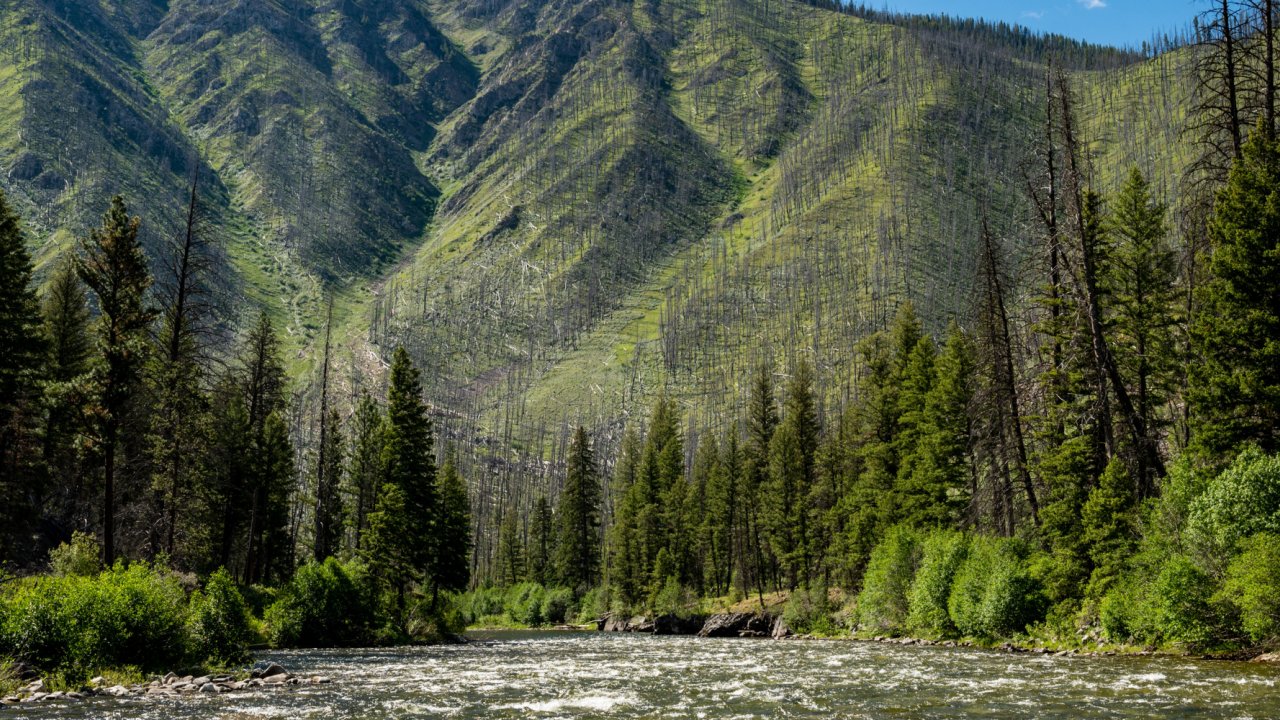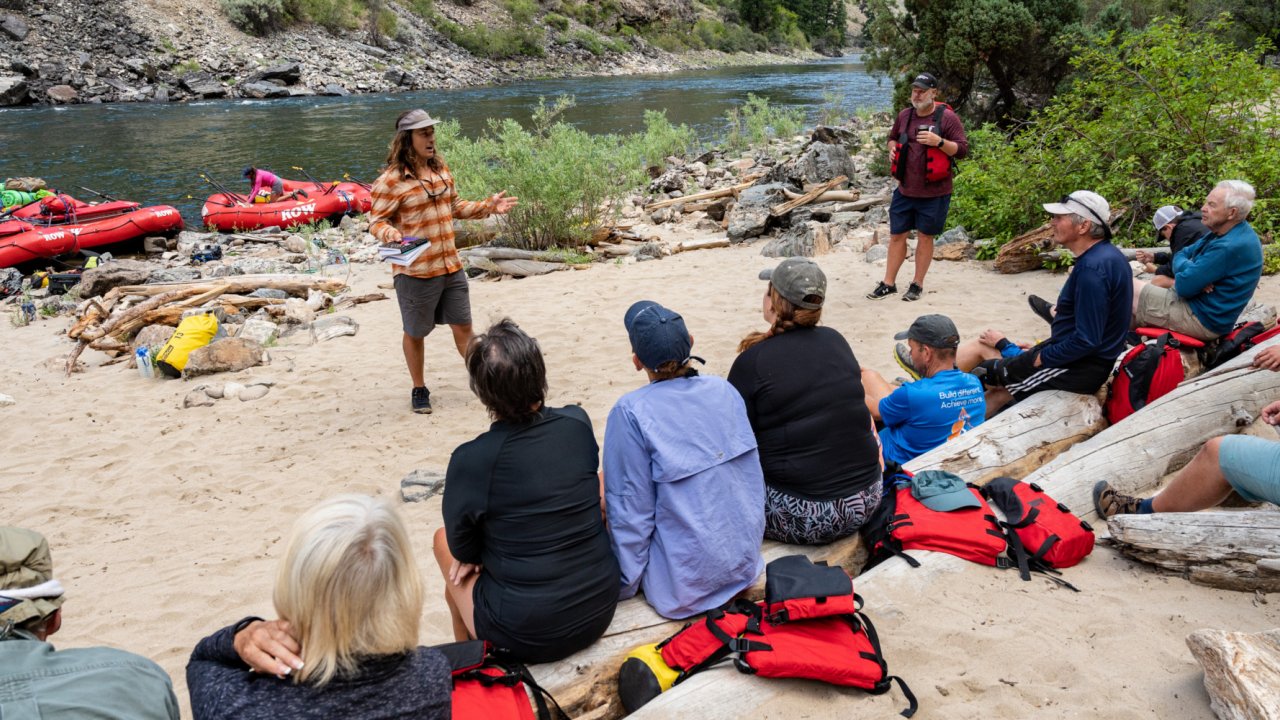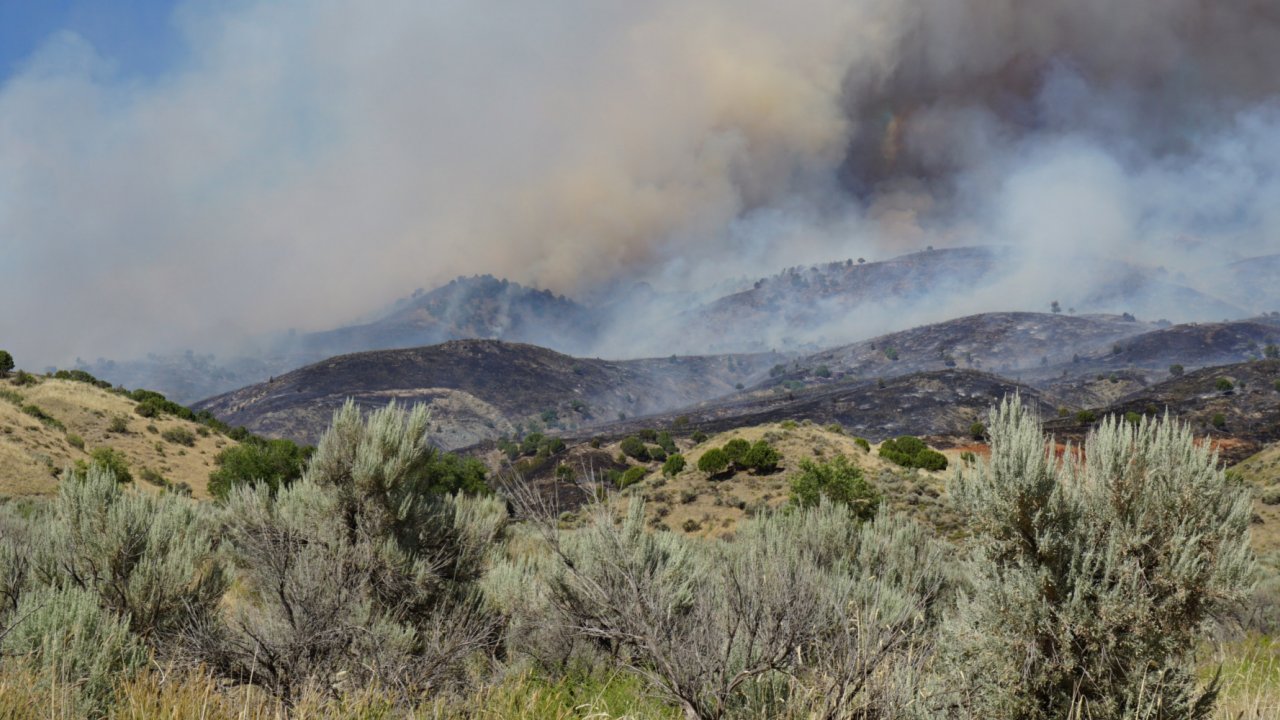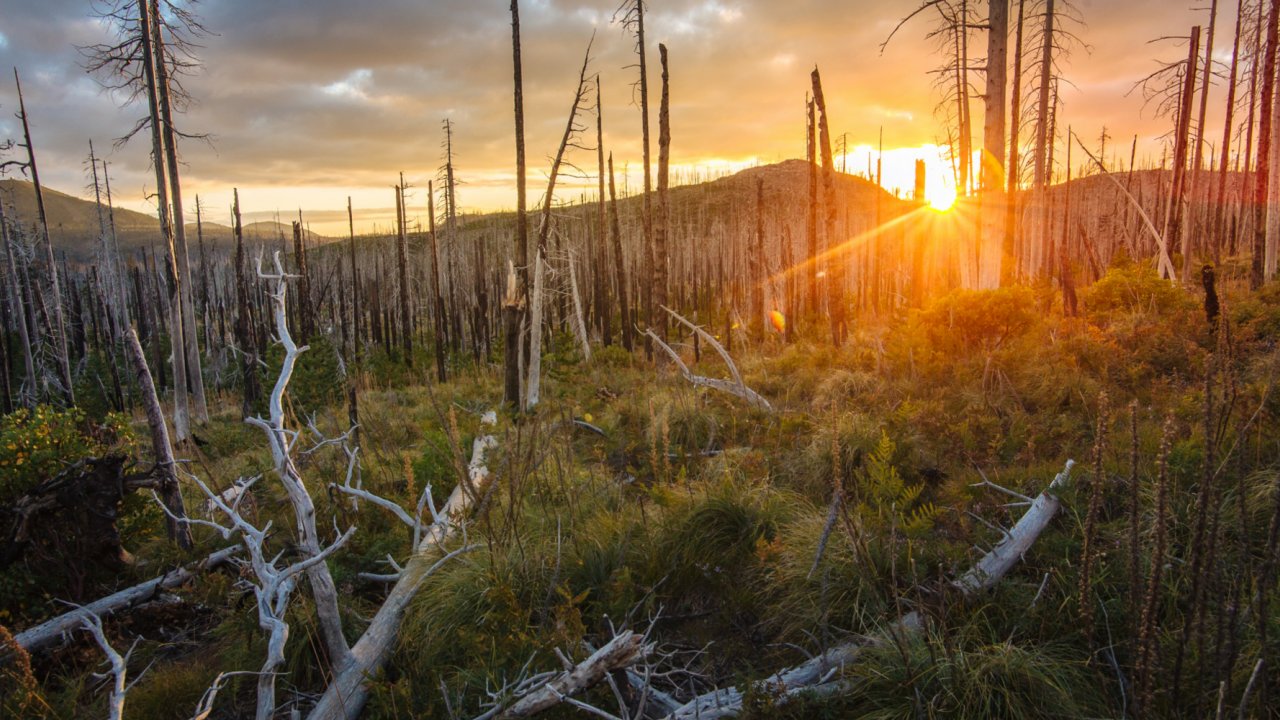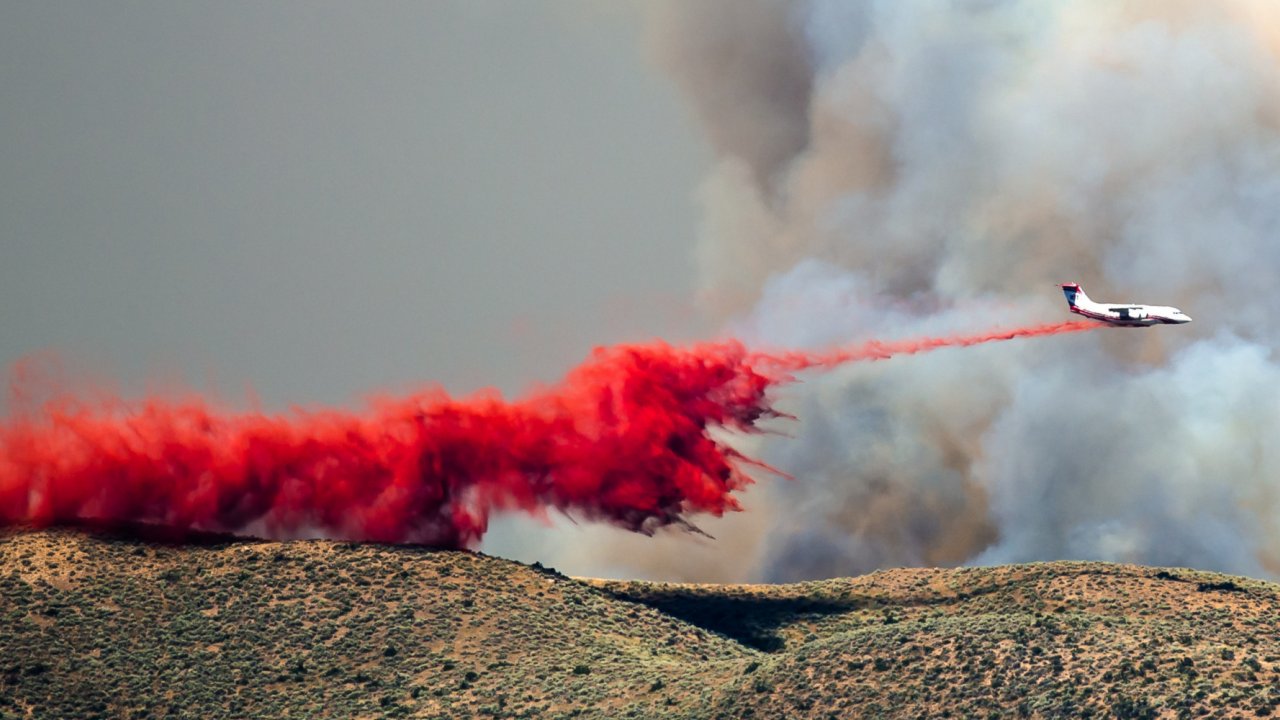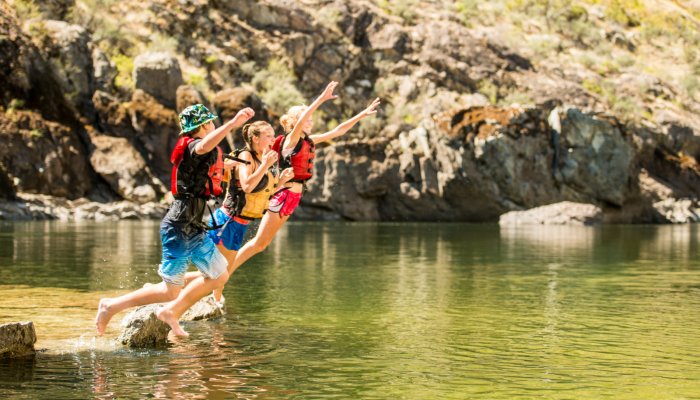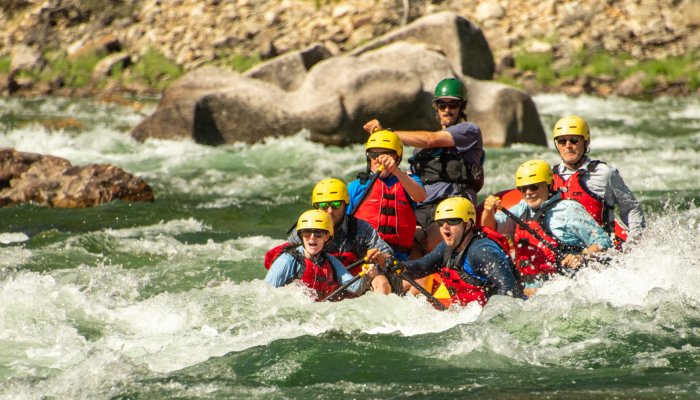Wild Fires and Your ROW Adventures Trip
In our more than four decades in business we have been through several seasons with severe wildlands fires in both grass and forest settings. Forest fires are a natural part of the landscape in the U.S. and Canadian West. Prior to the idea of fighting forest fires, fires would burn through forests and grasslands every five to 20 years, usually started from lightning strikes. Sometimes the fires would burn grassy slopes and pass quickly over the land, and other times they would burn forests of trees and spread more slowly. Every 100 or so years the land would also see “catastrophic fires” where many thousands of acres would burn and due to drought conditions, do more damage and burn hotter than most fires.
We continue to operate our trips within fire conditions unless a managing agency such as the US Forest Service or Bureau of Land Management closes the river. The closure of a river is a rare occurrence. If this does happen, we reserve the right to transfer your trip to another river, per our Terms & Conditions. This has happened twice in our history when we had to move two trips from the Middle Fork of the Salmon to the Lower Salmon River Canyons and another time when fires on the Rogue forced us to move to the Deschutes. Should this happen, we work with our guests to do the best we can to maintain your original arrival and departure points. However, we do not offer refunds in these situations, which is why we strongly recommend you protect your trip with a Trip Insurance policy.
For some people, smoke inhalation is a concern, especially those that have asthma. However, smokey conditions do not cause us to cancel or move trips.
We understand that some people are more concerned about inhaling poor quality air than others. During fire season it is not uncommon to have air quality that measures 70-150, or greater, according to data found on the EPA AirNow website. However, conditions can fluctuate widely in short periods of time. Air temperatures can drop, rain can commence and/or fire fighting efforts can be successful. Any of these factors will usually cause fires to subside and thus reduce smokey conditions. Sometimes winds shift and air quality improves. Conversely, sometimes during a trip the air quality gets worse. When you are signing up for a wilderness trip, you need to understand that fire and smoke may have a negative impact on the experience. If this is not something you can tolerate, perhaps taking a wilderness rafting trip is not a good choice for you.
One reason we highly recommend that you protect your vacation investment with travel insurance is that should your trip be altered due to a fire closure, and we cannot perform the trip on the river you scheduled, you are generally eligible for a reimbursement of the funds you protected. As well, if you have a medical condition that would make participating in the trip risky, your travel insurance would generally provide protection. (Be sure you review the policy you buy to understand coverage.)
We do not recommend relying on national news as an accurate source of fire conditions that are specific to the rivers we float or areas we visit. Conditions change on a daily basis. While one stretch of river might be smokey, another just 10 miles downstream may not be.
Websites like InciWeb - Incident Information System are a much better source of information. If a specific fire starts, this website creates a dedicated page to that fire. If that happens, look for a post on this page with a link. In 2021 we had a couple of big fires in Idaho but we ran all our trips as scheduled. Our guides reported that on some days it was very smokey and visibility was reduced. Other days, especially after a cool and non-windy night, the air cleared considerably.
Fires are just one of the challenges we face in operating in wilderness areas and wild country. High and low water are another natural variable as are road closures due to rock slides or other events. We do our best to make sound decisions based on our knowledge of current conditions. When you sign up for one of our trips you acknowledge that you are traveling into the backcountry where conditions are variable and driven by nature. We appreciate that your tolerance of smokey or other natural conditions may be different from ours. However, as noted, we operate our trips during forest fires unless government closures prevent that and, in this case, we do our best to provide a substitute trip.
To better understand why we are having more severe fires in the United States than we have in the past, please keep reading.
A Short History of Forest Fires and Fire Management Science in the United States
Forest fire management is far from a perfect science. In the early 1900’s there was a big debate in the U.S. about whether or not to fight fires. Timber industry interests argued that fires should be fought to prevent the loss of valuable timber. Fire scientists at the time (which was admittedly a new field of study) argued that by fighting fires, the natural course of events would be disturbed and ultimately, we would end up with bigger fires. The reason is that frequent forest fires clear grasses, bushes and fallen limbs, and generally move quickly through the landscape, not spending enough time beneath the trees to ignite them. When we fight fires, we allow the fallen branches to sit on the ground as kindling, grasses and bushes grow bigger, and this provides fuel to fires to become bigger and hotter than they would be in a natural ecosystem.
The argument about whether or not to fight fires in the early days of the U.S. Forest Service, was settled when the 1910 fire in Idaho, known as the Big Burn, took place. It galvanized public and political opinion toward the idea of fighting fires. From 1911 until 1988, the marching orders of public land management agencies was “put out fires no matter the cost.”
This changed in 1988 when Yellowstone National Park burned. The public was outraged that fire fighters couldn’t protect this iconic National Park and wanted to know why. A Congressional inquiry was launched. In the end, the fire scientists who had warned against fighting fires were proven right. Eight decades of fighting fires has caused a huge fuel load to build up in our forests. As well, stands of trees have grown more thick than they would have been in a natural fire landscape where fire visits every five to 20 years.
Since 1988, due to the controversy brought about by the Yellowstone fire, fire management has changed. Today as a nation, we generally take a “let it burn” approach. The exception to this rule is when human life or structures are in danger.
In an effort to mitigate eight decades of fighting fires, another common approach to try and return the ecosystem to a balanced state, is to light prescribed or “controlled” fires. These are fires that are lit on purpose, usually in the spring when the ground is moist and overall moisture content is high. Done well, these fires move slowly through the underbrush, burning overgrown grasses, bushes and fallen tree limbs while not harming the larger trees in the forest. Most of these go well, but sometimes miscalculations happen, such as the Cerro Grande Fire near Los Alamos, New Mexico that got out of control and burned over 40,000 acres from May to July 2000 and destroyed a number of homes.
Climate change is causing hotter temperatures around the world and in some parts of the world, more draught conditions. This is certainly the case in the U.S. West where we are seeing much larger and more catastrophic fires than any other time in post-European settlement.
We hope this information has been helpful. Please review the FAQ below. Our office staff are happy to answer any further questions you may have.
Do you still run your trips during forest or grass fires?
Usually yes. Unless a governing land management agency such as the U.S. Forest Service or Bureau of Land Management issues a closure order on the river, we keep operating our trips.
What if conditions along the river are smoky?
For most people smoke is an annoyance, but not a health risk. People with serious asthma may want to reconsider their participation in the trip. For others, while a lack of visibility does change the scenery on the trip, being in nature during a natural event like a forest fire offers many opportunities for learning. For many people, floating a river during a forest or grass fire event is a fascinating experience. The many other elements of the trip don’t change, such as fun rapids, evening camaraderie, walks to historic or cultural sites, etc.
Does Trip Insurance cover fire as a reason to cancel?
Please read the details of your insurance policy when you receive it. Generally speaking, if a trip cannot be performed due to government closures, regular travel insurance will cover a refund of your monies paid. Thus, if you don't want to partake in the substitute river we may be able to offer, you would likely have that option. If you purchase CFAR (Cancel for any reason) then you can cancel for any reason up until 48 hours prior to the start of your coverage date and receive compensation per the policy details.
What happens if there is an emergency or change in a fire while I'm on the river?
Governing agents of the rivers work to keep commercial and personal recreators informed of current conditions. In the event of an extreme or unexpected emergency, our trips always carry a satellite phone to call for help or assistance. The flowing river also provies us with a vehicle and opportunity to change locations, move camp, etc.
How might a wildfire or smoke change my experience on a river trip?
While you may experience some reduced visibility, hazy skies, and general smoky conditions, the normal day to day operation of your trip will proceed as planned. You can expect to still spend your days rafting, swimming, hiking, enjoying time at camp, and relaxing! Taking in an orange sunrise or sunset is often a unique and beautiful moment guests have the opportuntiy to experience during a fire event.
When do you cancel a trip due to an active wildfire?
ROW will only cancel a trip if the governing land management agency such as the U.S. Forest Service or Bureau of Land Management issues a closure order on the river or wilderness area in which we operate.
What is the best way to protect my vacation investment during fire season?
ROW Adventures recommends pruchasing a Cancel for Any Reason Travel Insurance policy, giving you increased flexibililty to cancel your vacation and recoup your investment, even if ROW still operates the trip. Our team of Adventure Consultants are happy to recommend a trusted Insurance provider if desired.
What website do you recommend for current and accurate fire information?
We recommend InciWeb - Incident Information System as a helpful resource.
What should I do if I choose to cancel or reschedule my trip due to fire concerns?
We ask that you notify our team of Adventure Consultants as soon as possible so we can assist you with your reservation as well as update our operations team of the change. Please note, that if you choose to cancel your trip, you are subject to our standard Terms and Conditions. As such, we highly recommend protecting your investment with trip interruption or cancelation insurance.

A Memorable Moment
In 2019, our Rogue River crew had the memorable opportunity to share a beach with a group of firefighters who had just finished extinguisng a forest fire. Forest Office/Engine Boss, Nick Cardillo, shared this kind note and images with us afterwards.
"Hello, Im a forest officer/engine boss with Oregon Department of Forestry Grants Pass in Merlin,Oregon (Engine #275). We had lightning recently and my Engine, another Engine (#378) and our 8 man hand crew responded a few miles above Russian Creek on the Rogue. For the last 54 hours we battled this fire with very limited supplies. Long story short, the fire is 100% out now. Last night after wrapping up the fire we made a horrible hike down to Tyee Camp where a group being led by your Guides was already camped for the night. They got a little show of a bunch of dirty stinky fireman hiking out of forest and setting up camp with me ordering a sling load from our helicopter to resupply us. I want to personally say thank you very much, your guides and guests were some great people." (content has been slightly edited for clarity)
Nick Cardillo
Forest Officer/Engine Boss
Oregon Depatment of Forestry Grants Pass
Engine #275

